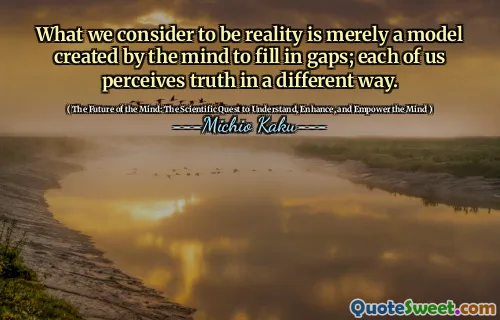
What we consider to be reality is merely a model created by the mind to fill in gaps; each of us perceives truth in a different way.
This quote highlights a profound aspect of human perception and cognition. It suggests that our understanding of reality is not an absolute, objective truth but rather a subjective construct formed by our minds. Our brains are continuously trying to interpret and make sense of the vast amount of sensory information they receive. Since no one perceives the world in exactly the same way—due to differences in experiences, interpretations, and neurological makeup—each person constructs their unique reality. This idea challenges the notion of a single, universal truth, emphasizing instead that reality is, to some extent, a personal experience. The concept resonates deeply with philosophies that question the very nature of truth and knowledge, such as relativism and constructivism. It encourages humility in our claims of understanding the world and reminds us that our perceptions are limited by our cognitive frameworks. Recognizing that our truths are subjective can foster greater empathy, patience, and openness toward others’ perspectives. It also invites us to acknowledge the provisional nature of our beliefs and to remain open to new information that might reshape our understanding. In the broader scope of science and philosophy, this idea aligns with the understanding that much of what we think is real is an approximation—models and theories that help us navigate the world but are not the ultimate reality itself. The awareness of this can lead to a more curious, open-minded approach to life, encouraging ongoing inquiry and humility in our pursuits of knowledge.






